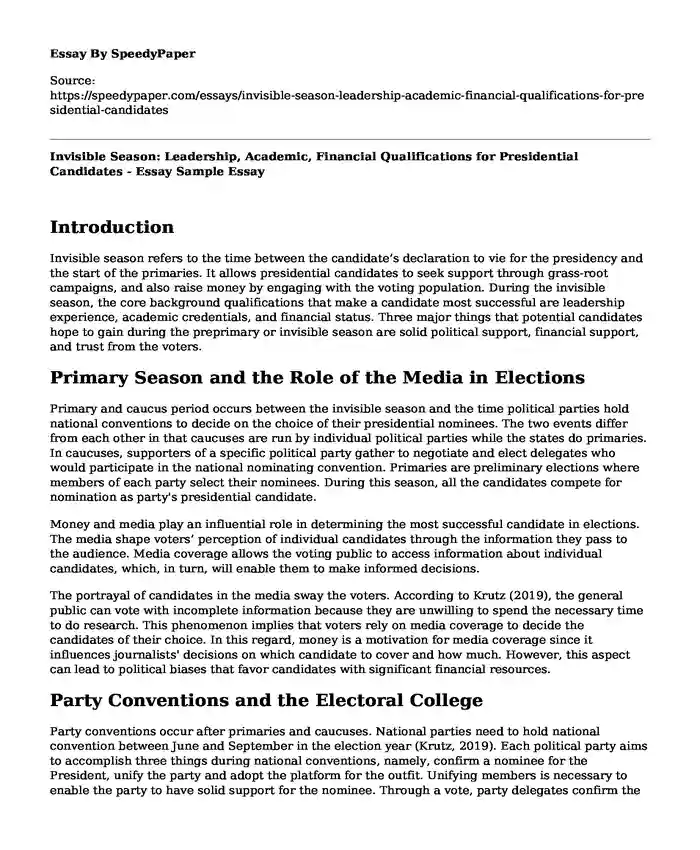
| Type of paper: | Essay |
| Categories: | United States Government |
| Pages: | 4 |
| Wordcount: | 851 words |
Introduction
Invisible season refers to the time between the candidate’s declaration to vie for the presidency and the start of the primaries. It allows presidential candidates to seek support through grass-root campaigns, and also raise money by engaging with the voting population. During the invisible season, the core background qualifications that make a candidate most successful are leadership experience, academic credentials, and financial status. Three major things that potential candidates hope to gain during the preprimary or invisible season are solid political support, financial support, and trust from the voters.
Primary Season and the Role of the Media in Elections
Primary and caucus period occurs between the invisible season and the time political parties hold national conventions to decide on the choice of their presidential nominees. The two events differ from each other in that caucuses are run by individual political parties while the states do primaries. In caucuses, supporters of a specific political party gather to negotiate and elect delegates who would participate in the national nominating convention. Primaries are preliminary elections where members of each party select their nominees. During this season, all the candidates compete for nomination as party's presidential candidate.
Money and media play an influential role in determining the most successful candidate in elections. The media shape voters’ perception of individual candidates through the information they pass to the audience. Media coverage allows the voting public to access information about individual candidates, which, in turn, will enable them to make informed decisions.
The portrayal of candidates in the media sway the voters. According to Krutz (2019), the general public can vote with incomplete information because they are unwilling to spend the necessary time to do research. This phenomenon implies that voters rely on media coverage to decide the candidates of their choice. In this regard, money is a motivation for media coverage since it influences journalists' decisions on which candidate to cover and how much. However, this aspect can lead to political biases that favor candidates with significant financial resources.
Party Conventions and the Electoral College
Party conventions occur after primaries and caucuses. National parties need to hold national convention between June and September in the election year (Krutz, 2019). Each political party aims to accomplish three things during national conventions, namely, confirm a nominee for the President, unify the party and adopt the platform for the outfit. Unifying members is necessary to enable the party to have solid support for the nominee. Through a vote, party delegates confirm the nomination of the candidate that wins majority votes during caucuses and primaries. The national media shows speeches during national party conventions. The role of the media during conventions affects the success of the nominees since it can help bolster the ideologies of specific candidates around party policy. Also, it plays the role of name recognition.
Priming and framing are common during general elections as party nominees try to sway eligible voters. Framing shape how the electorate view generalizations like socioeconomics and race (Krutz, 2019). Priming occurs when media coverage predisposes the audience to a specific perspective on issues affecting the population. The season starts after the national party convention in the election year. However, it is different from the primary and caucus season since political parties’ nominees are competing against each other. In primaries and caucuses, it is candidates under one-party who compete for the nomination. Candidates are called nominees during the general election season because they represent their parties in presidential elections. During this time, there is more media attention in battleground states because the candidate on either side of the political divide can reasonably win the votes. Media also focuses on the swing states to analyze and report on the actual situation on the ground.
Election Day is the first Tuesday after the first Monday in November of the election year. The popular vote exists to allow the voters to elect a slate of electors (Krutz, 2019). The civic duty to vote and a desire to have a leader that will bring change motivates people to participate in elections. If a large number of eligible voters do not vote, the system and even democracy become weak. Electors have a primary role in selecting the President of the US. Electors in each state equal two individuals representing the senators the state has in Congress plus the number of representatives. As per the law, electors vote on the first Monday after the second Wednesday in December (Krutz, 2019). The Electoral College has 538 electors, and a nominee has to get 270 electoral votes to win elections (Krutz, 2019). This figure represents a simple majority. The inauguration of the President is January 20th, after every four years (Krutz, 2019).
The system of electing the US President has weaknesses because it creates the possibility of having a minority president. For this reason, the outcome may not reflect t the will of the people. However, the system is also good because it encourages the distribution of popular support, and it considers the interests of the minority groups in different states.
Reference
Krutz, G. S. (2019). American government (2nd Ed.). OpenStax.
Cite this page
Invisible Season: Leadership, Academic, Financial Qualifications for Presidential Candidates - Essay Sample. (2023, Oct 15). Retrieved from https://speedypaper.net/essays/invisible-season-leadership-academic-financial-qualifications-for-presidential-candidates
Request Removal
If you are the original author of this essay and no longer wish to have it published on the SpeedyPaper website, please click below to request its removal:
- Essay Example on Democratizing the Policy Process
- Liberating African-Americans: The Nation of Islam
- Essay Example on Religion of the First Americans
- Essay Example: Atomic Bomb in Hiroshima and Nagasaki
- Essay Sample on Significance of John F. Kennedy
- Free Essay: Constitution and the Mixed States
- Essay Sample on Challenges in Correctional Management
Popular categories




